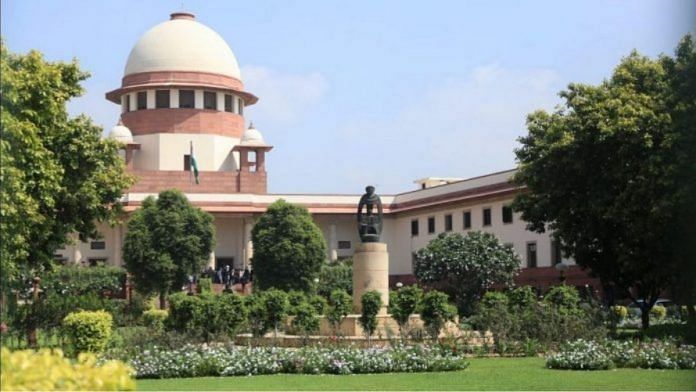New Delhi: The Supreme Court has used the term “pregnant persons” instead of “pregnant woman” or “pregnant girl” in one of its judgments — a departure from conventional practice.
A three-judge bench, led by Chief Justice D.Y. Chandrachud, also added a footnote in the verdict to explain why it preferred to use the term.
“We use the term ‘pregnant person’ and recognise that in addition to cisgender women, pregnancy can also be experienced by some non-binary people and transgender men among other gender identities,” said the bench, also comprising Justices J.B Pardiwala and Manoj Mishra.
Authored by CJI Chandrachud, the 21-page judgment recalled its earlier verdict that allowed a 14-year-old girl to terminate her over 30-week-old pregnancy. Pronounced on 29 April, the detailed judgment, letting the girl carry on with the full-term pregnancy, has been released now.
In April last year, the CJI stoked controversy by observing that “there was no absolute concept of man or woman” and the “postulation was far more complex that categorising a person according to the born-with genitals”. His comments were part of the deliberations that took place when a five-judge bench was hearing a batch of petitions demanding legal recognition for same-sex marriage. The bench by a majority rejected the plea.
Though verbal, the CJI’s remarks drew a sharp response from solicitor general Tushar Mehta, who told the bench that “such a fluid concept of man or woman would render several laws unworkable, which differentiate a biological man from a biological woman”.
When Mehta spoke of the existence of the concept of a man and woman in laws such as the Special Marriage Act, Justice Chandrachud told him he was making a “very important value judgement by saying that the very notion of a biological man or a biological woman is absolute”.
Notably, this is not the first time the CJI has used a gender-neutral term in a verdict authored by him. In March this year, as the head of a seven-judge bench, the CJI wrote the judgment on the scope of parliamentary privileges. In it, he used the term “founding parents”.
This was a reference to the members of the Constituent Assembly. Of the 389 members of the Constituent Assembly who were indirectly elected by members of provincial assemblies, 15 were women.
This too marked a departure from the often-used term “founding fathers” to describe those who contributed to the drafting of the Constitution.
CJI Chandrachud had used the term “founding parents” for the first time in 2018. The expression was also mentioned in the opinion he authored as a member of the five-judge bench that decided the dispute with the Centre over the administrative powers in Delhi. He also referred to the phrase “founding mothers” twice.
In that judgment, he quoted American historian Granville Austin, considered a leading authority on the Constitution of India, to say: “India’s founding fathers and mothers established in the Constitution both the nation’s ideals and the institutions and processes for achieving them.”
“The President was designated as the titular head of government. The founding fathers and mothers of the Constitution adopted the convention which made the President generally bound by the advice of the Council of Ministers,” the judgment went on to add, underlining the role of the 15 women who contributed to the drafting of the Constitution.
(Edited by Tikli Basu)
Also read: SC ruling on bonds good but transparency problem in election expenditure still untouched



